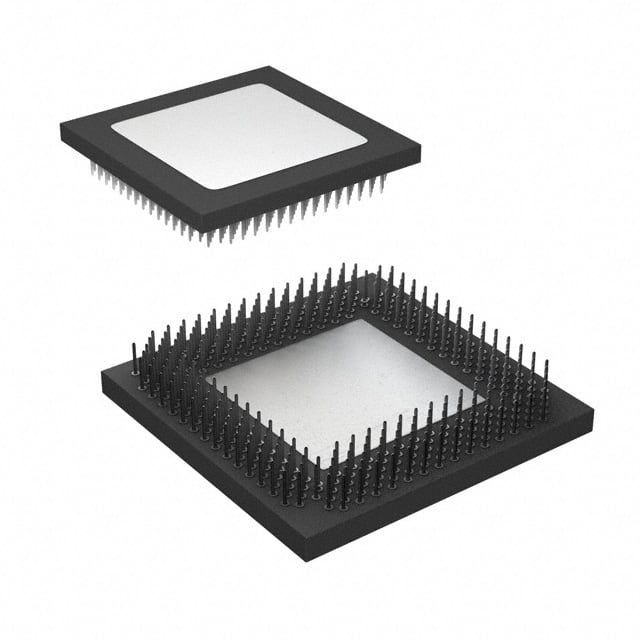Vedi le specifiche per i dettagli del prodotto.

TMS320C80GF60
Product Overview
Category
The TMS320C80GF60 belongs to the category of digital signal processors (DSPs).
Use
It is primarily used for high-performance signal processing applications.
Characteristics
- High-speed processing capabilities
- Efficient power consumption
- Advanced architecture for parallel processing
- Integrated peripherals for enhanced functionality
Package
The TMS320C80GF60 is available in a compact and durable package, suitable for various electronic devices.
Essence
The essence of the TMS320C80GF60 lies in its ability to provide fast and efficient signal processing for demanding applications.
Packaging/Quantity
The product is typically packaged individually and is available in various quantities depending on the manufacturer's specifications.
Specifications
- Architecture: Digital Signal Processor (DSP)
- Clock Speed: Up to 600 MHz
- Instruction Set: VLIW (Very Long Instruction Word)
- Memory: On-chip memory and external memory interface
- Peripherals: Integrated peripherals for connectivity and control
- Power Supply: Voltage range specified by the manufacturer
- Operating Temperature: Range specified by the manufacturer
Detailed Pin Configuration
The TMS320C80GF60 has a specific pin configuration that enables proper connectivity and integration within electronic systems. Please refer to the datasheet provided by the manufacturer for detailed pin descriptions and diagrams.
Functional Features
- High-performance signal processing capabilities
- Parallel processing architecture for efficient execution of complex algorithms
- Integrated peripherals for enhanced functionality and connectivity
- Flexible memory options for efficient data storage and retrieval
- Support for various communication protocols and interfaces
Advantages and Disadvantages
Advantages
- High-speed processing capabilities enable real-time signal processing applications.
- Efficient power consumption ensures optimal energy usage.
- Advanced architecture allows for parallel processing, enhancing overall performance.
- Integrated peripherals reduce the need for additional components, simplifying system design.
Disadvantages
- Complex architecture may require a steep learning curve for developers.
- Limited availability of alternative models may restrict design flexibility.
- Higher cost compared to some other DSPs in the market.
Working Principles
The TMS320C80GF60 operates on the principles of digital signal processing. It utilizes its high-speed processing capabilities and parallel architecture to execute complex algorithms efficiently. The processor fetches instructions from memory, performs arithmetic and logical operations, and communicates with peripherals to process and manipulate signals.
Detailed Application Field Plans
The TMS320C80GF60 finds applications in various fields that require high-performance signal processing. Some potential application areas include:
- Telecommunications: Signal processing for wireless communication systems, base stations, and network infrastructure.
- Audio and Video Processing: Real-time audio and video encoding/decoding, multimedia streaming, and compression algorithms.
- Industrial Automation: Control systems, robotics, and machine vision applications.
- Medical Imaging: Image processing for medical diagnostics, such as MRI and CT scans.
- Automotive: Advanced driver assistance systems (ADAS), engine control units (ECUs), and infotainment systems.
Detailed and Complete Alternative Models
While the TMS320C80GF60 is a powerful DSP, there are alternative models available in the market that offer similar functionalities. Some notable alternatives include:
- TMS320C6748: A lower-cost DSP with comparable performance for general-purpose signal processing applications.
- ADSP-BF706: A DSP from Analog Devices with advanced features for audio and video processing.
- STM32F7 series: Microcontrollers from STMicroelectronics that combine DSP capabilities with microcontroller functionality.
These alternative models provide designers with options based on their specific requirements and budget constraints.
Word count: 520 words
10 domande e risposte comuni relative all'applicazione di TMS320C80GF60 nelle soluzioni tecniche
Sure! Here are 10 common questions and answers related to the application of TMS320C80GF60 in technical solutions:
Q: What is TMS320C80GF60? A: TMS320C80GF60 is a high-performance digital signal processor (DSP) from Texas Instruments, designed for applications requiring real-time processing and high-speed data transfer.
Q: What are the key features of TMS320C80GF60? A: Some key features include a 32-bit floating-point DSP core, multiple high-speed interfaces, integrated memory, and support for various communication protocols.
Q: What are the typical applications of TMS320C80GF60? A: TMS320C80GF60 is commonly used in applications such as industrial automation, robotics, motor control, image and video processing, and high-speed data acquisition systems.
Q: How does TMS320C80GF60 handle real-time processing requirements? A: TMS320C80GF60 has a highly optimized architecture with parallel processing units, SIMD instructions, and dedicated hardware accelerators, enabling it to efficiently handle real-time processing tasks.
Q: Can TMS320C80GF60 interface with other devices or peripherals? A: Yes, TMS320C80GF60 supports various high-speed interfaces like Ethernet, USB, SPI, I2C, UART, and CAN, allowing seamless integration with other devices and peripherals.
Q: Does TMS320C80GF60 have built-in memory? A: Yes, TMS320C80GF60 integrates both program memory (Flash) and data memory (RAM), reducing the need for external memory components and simplifying system design.
Q: Is TMS320C80GF60 suitable for power-sensitive applications? A: Yes, TMS320C80GF60 incorporates power-saving features like clock gating, dynamic voltage scaling, and low-power modes, making it suitable for power-sensitive applications.
Q: Can TMS320C80GF60 handle high-speed data transfer? A: Absolutely, TMS320C80GF60 supports high-speed interfaces and has dedicated DMA controllers, enabling efficient and fast data transfer between peripherals and memory.
Q: Are there development tools available for programming TMS320C80GF60? A: Yes, Texas Instruments provides a comprehensive software development kit (SDK) along with an integrated development environment (IDE) to program and debug TMS320C80GF60.
Q: Where can I find additional resources and support for TMS320C80GF60? A: You can refer to the official documentation, application notes, and user forums on the Texas Instruments website for additional resources and support related to TMS320C80GF60.

